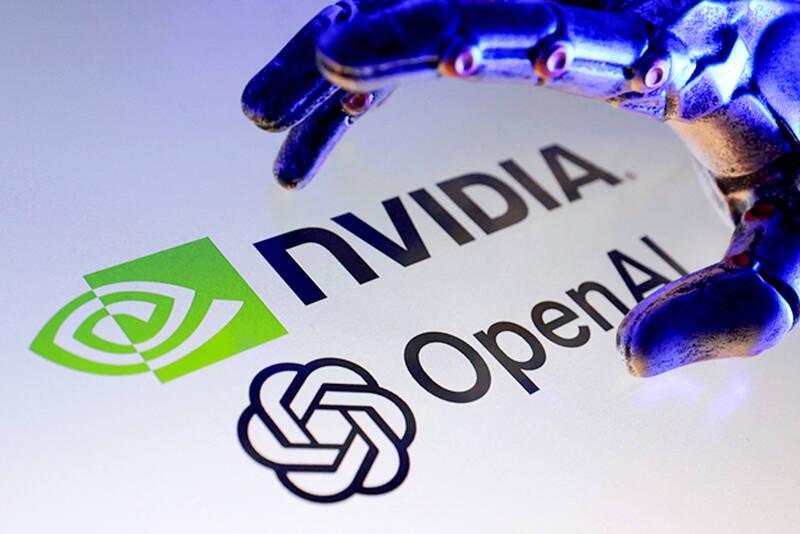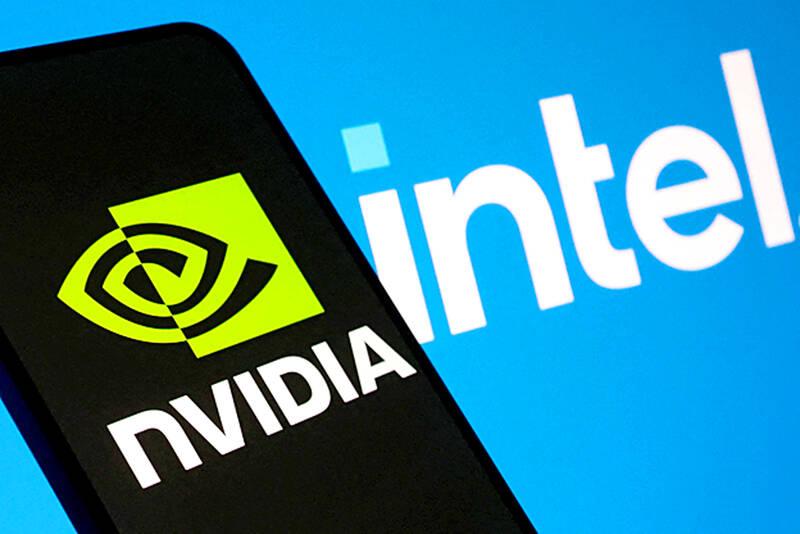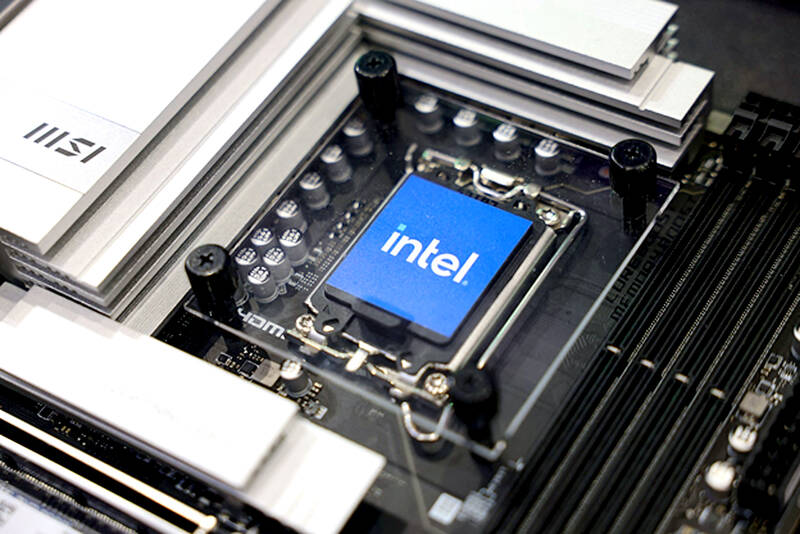Nvidia Corp. will invest as much as US$100 billion in OpenAI to support new data centers and other artificial intelligence infrastructure, a blockbuster deal that underscores booming demand for AI tools like ChatGPT and the computing power needed to make them run.
The companies announced the agreement Monday last week, saying they had signed a letter of intent for a strategic deal. The investment is meant to help OpenAI build data centers with a capacity of at least 10 gigawatts of power — equipped with Nvidia’s advanced chips to train and deploy AI models.
The companies are helping lead a global push to build data centers for a new generation of AI tools — an undertaking that is expected to cost trillions of dollars in total. The effort requires advanced chips, servers, cooling systems and enormous amounts of electricity.

Nvidia and OpenAI logos are seen in this illustration taken on Sept. 22.
Photo: Reuters
The scope of the Nvidia-OpenAI endeavor would be particularly massive: Ten gigawatts is equivalent to the peak electricity demand of New York City.
“This investment and infrastructure partnership mark the next leap forward — deploying 10 gigawatts to power the next era of intelligence,” Nvidia Chief Executive Officer Jensen Huang said in a statement.
Nvidia has been using its financial might to make sure the company’s technology remains at the heart of AI systems. With the OpenAI deal, it’s strengthening ties with a vital ally. The startup makes the market-leading chatbot and is working to expand its own AI infrastructure. The agreement signals that OpenAI will remain a key Nvidia customer, even as the company seeks other suppliers.

OpenAI CEO Sam Altman and Nvidia CEO Jensen Huang arrive to attend the State Banquet during US President Donald Trump’s state visit, at Windsor Castle, in Windsor, UK on Sept. 17. OpenAI
Nvidia also has positioned itself as a champion of domestic technology infrastructure — a priority of the Trump administration. The Santa Clara, California-based chipmaker has been working to build goodwill with the White House at a time when it needs Washington to ease China export restrictions.
On Sept. 18, Nvidia agreed to invest as much as US$5 billion in Intel Corp., the long-struggling chipmaker that is now partially owned by the US government.
On Monday last week, OpenAI CEO Sam Altman said the Nvidia deal would lead to new AI breakthroughs by securing the necessary computing power.

Nvidia and Intel logos are seen in this illustration taken Sept. 18.
Photo: Reuters
“Everything starts with compute,” he said in the statement. “Compute infrastructure will be the basis for the economy of the future.”
OpenAI’s ChatGPT is used by roughly 700 million people weekly and takes an intensive amount of computing power to service and build its products. In the past, the company has faced computing constraints in its ability to meet customer demand, particularly around new releases. On Sunday, Altman posted on social media that his company will be launching some new “compute-intensive” product offerings in the next few weeks.
According to Huang, the project will encompass as many as 5 million of Nvidia’s chips, a number that’s equal to what the company will ship in total this year. He called it a “giant project” in an interview on CNBC.

A sample of an Intel chip is displayed during Computex 2024 in Taipei on June 4 last year.
Photo: AFP
Nvidia was also part of recent deals to expand the computing infrastructure in the UK, France and the Middle East, and has backed a number of AI startups.
Nvidia dominates the market for AI accelerators, the powerful chips that help develop and run AI models. Its growing influence over the tech industry has drawn scrutiny, with the US Justice Department probing last year whether the chipmaker violated antitrust laws. US President Donald Trump even mused about breaking up Nvidia to increase competition, but acknowledged it would be hard for rivals to catch up.
At the same time, there have been concerns that the AI spending surge will contribute to a market bubble — something akin to the dot-com boom and bust. Altman himself acknowledged the existence of a bubble last month but argued that AI will provide transformative value to the economy and that smaller, overvalued startups are the ones most at risk.
SOURCE TAIPEI TIMES




